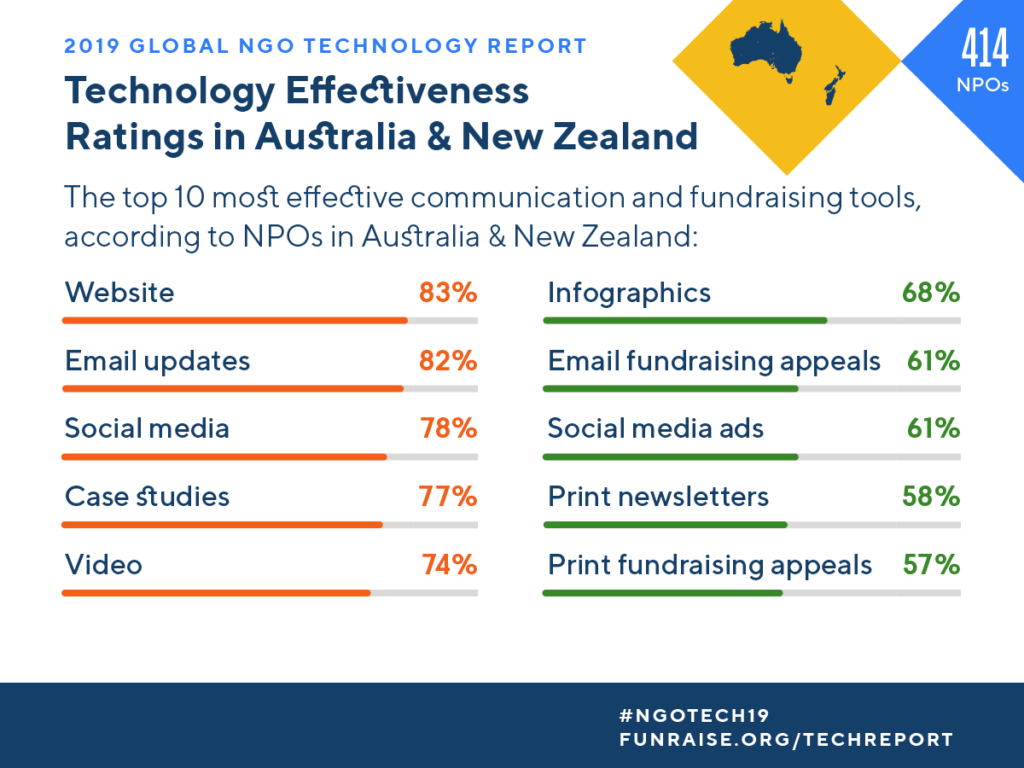The Global NGO Technology Report, a biennial research project that seeks to gain a better understanding of how non-governmental organizations (NGOs) worldwide use technology, revealed 2019 most effective communication and fundraising tools for NGOs.
Sponsored by Funraise and produced by Nonprofit Tech for Good, the report examined how NGOs use web and email communications, online fundraising tools, social media, mobile technology, and productivity software.
Now in its fourth edition, this year’s report provides technology benchmarks for Africa, Asia, Australia and New Zealand, Europe, Latin America and the Caribbean, and the United States and Canada.
Heather Mansfield, Editor-in-chief of Nonprofit Tech for Good and producer of the Global NGO Technology Report said: “There are an estimated 10,000,000 NGOs in the world – and less than half are online. In the coming two decades, the number of NGOs using the Internet for social change and fundraising will double. The Global NGO Technology Report is essential to providing benchmarks for success for the next wave of NGOs coming online and provides valuable insight into how they should be utilizing the internet for good.”
Survey respondents asked to rate the tools listed provided valuable insights into which tools NGOs should prioritize in their communications and fundraising strategy. Among twenty tools, websites scored 51% very effective, followed by 47% from social media, and 45% from video. Email update still showed it works with a score of 41% very effective, while email fundraising appeals scored 40% somewhat effective. Peer-to-peer fundraising and crowdfunding scored 37% and 36%, respectively.
Justin Wheeler, CEO & Co-founder, Funraise said: “The 2019 edition of the Global NGO Technology Report reveals how quickly technology is growing, and more importantly, how technology is being used by nonprofits to change the world.”
He added that in particular, peer-to-peer, networked fundraising tools are expanding to all corners of the globe, empowering NGOs to raise funds in ways they never knew would work for them—in many cases, for the first time.
Compared to the global average, NGOs in Australia & New Zealand have an exceptionally high adoption of recurring or monthly giving at 84%, tribute giving at 49%, and peer-to-peer fundraising at 37%.
The report showed that 95% of NGOs in Australia have a website with 25% accessible to people with disabilities, the highest rate worldwide. The global average is 18%.
However, NGOs in Australia & New Zealand have the lowest participation rate in #GivingTuesday worldwide at 7%. Of those, only 20% plan to participate in 2019 despite raising 50% more in 2018 than in 2017.
The use of messaging apps dropped from 8% in 2018 to 3% in 2019. This decline reflects a drop in the effectiveness rating for messaging apps by NGOs worldwide from 88% in 2018 to 66% in 2019.
Australia & New Zealand is the only region where print newsletters and print fundraising appeals make the top 10 list of the most effective communication and fundraising tools used by NGOs.
Heather Mansfield said they launched the Global NGO Technology Report to create a more equitable and balanced picture of the digital revolution occurring worldwide. She said NGOs and nonprofits in wealthy nations, such as the United States, Canada, and Australia, have access to data about digital communications and fundraising. But in Africa, Asia, the Middle East, and Latin America and the Caribbean – there’s little to no research on the subject in the NGO sector.
“By partnering with 24 organizations worldwide, we are able to share that data and knowledge with the NGOs that need it most,” she said.
Pearl Dy is a community manager and journalist. She is passionate about business and development particularly involving not-for-profits, charity and social entrepreneurship.
- Pearl Dyhttps://thirdsector.com.au/author/pearl-dyakolade-co/
- Pearl Dyhttps://thirdsector.com.au/author/pearl-dyakolade-co/
- Pearl Dyhttps://thirdsector.com.au/author/pearl-dyakolade-co/
- Pearl Dyhttps://thirdsector.com.au/author/pearl-dyakolade-co/











